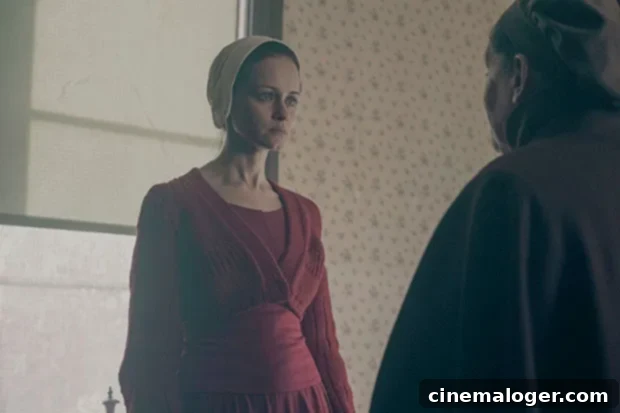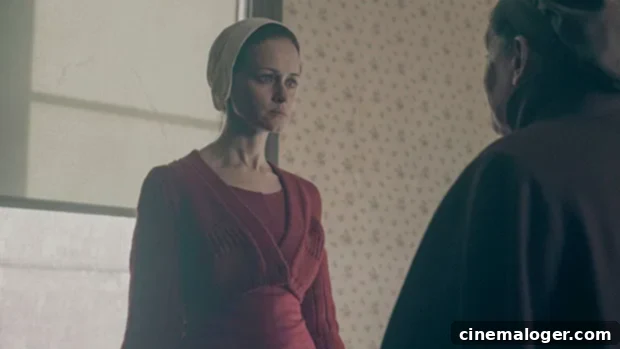Alexis Bledel Departs ‘The Handmaid’s Tale’: A Deep Dive into Emily’s Legacy and What’s Next for Season 5
The television landscape was met with a surprising announcement on May 27 when acclaimed actress Alexis Bledel confirmed her exit from Hulu’s critically celebrated dystopian drama, The Handmaid’s Tale. Bledel, who has been an integral part of the series since its premiere season, portrayed the compelling and complex character of Emily, also known as Ofglen. Her departure sent ripples through the show’s dedicated fanbase and the industry alike, given Emily’s pivotal role in the narrative and Bledel’s Emmy-winning performance.
In an official statement released to Variety, the 40-year-old actress expressed her decision to “step away” from her role. “After much thought, I felt I had to step away from The Handmaid’s Tale at this time,” Bledel stated. Her words conveyed a sense of deliberation and personal conviction behind the significant choice. She further extended her gratitude, adding, “I am forever grateful to Bruce Miller for writing such truthful and resonant scenes for Emily, and to Hulu, MGM, the cast and crew for their support.” This heartfelt acknowledgment underscores the profound impact the role and the series had on her, highlighting the collaborative effort that brought Emily’s harrowing journey to life on screen. Her exit marks a significant shift for the upcoming fifth season, leaving many to ponder the fate of Emily and the future direction of the show’s intricate storyline.
Emily’s Enduring Legacy: A Character of Resilience and Resistance
Alexis Bledel’s portrayal of Emily Malek, a former university professor of cellular biology, a wife, and a mother forced into the Handmaid role, was nothing short of transformative. From the moment she was introduced as Offred’s (June Osborne’s) shopping partner, Emily quickly became a symbol of defiance and the devastating human cost of Gilead’s oppressive regime. Her journey throughout the series has been one of unimaginable suffering, from enduring ritualistic rape and forced genital mutilation as punishment for her sexuality to witnessing unspeakable violence against her fellow Handmaids. Despite the relentless brutality, Emily’s spirit of resistance never truly faded. She orchestrated acts of rebellion, from poisoning a Guardian to actively participating in the underground network of Mayday.
Her character’s arc reached a critical point when she escaped Gilead and found asylum in Canada, a moment of profound emotional resonance for both Emily and the audience. Even after finding freedom, the scars of Gilead remained, influencing her interactions and her desperate desire to reunite with her wife and son. Bledel’s ability to convey such deep-seated trauma, resilience, and quiet fury, often with minimal dialogue, earned her widespread critical acclaim. Emily wasn’t just a victim; she was a survivor, a fighter, and a crucial voice in the resistance. Her presence in Canada, offering perspective and support to June and other refugees, underscored the ongoing battle against Gilead and the difficult process of healing after escaping such horror. The depth and nuance Bledel brought to Emily made her one of the most beloved and impactful characters on the show, making her departure all the more poignant.

Alexis Bledel’s Illustrious Career: Beyond the Red Robes
While Emily in The Handmaid’s Tale garnered Alexis Bledel significant accolades, including an Emmy Award for Outstanding Guest Actress in a Drama Series in 2017 (for Season 1, later promoted to main cast for subsequent seasons), her career boasts a diverse range of memorable roles. She received a total of four Emmy nominations for her work on the show, a testament to her consistent excellence. Before immersing herself in the grim world of Gilead, Bledel captivated audiences as Rory Gilmore in the beloved series Gilmore Girls. Starring opposite Lauren Graham, 55, from 2000 to 2007, Bledel’s portrayal of the intelligent, aspiring journalist Rory became an iconic figure for a generation of viewers. The show’s rapid-fire dialogue, intricate mother-daughter relationship, and exploration of small-town life cemented its place in television history, showcasing Bledel’s ability to shine in a lighter, yet equally complex, dramatic setting.
Beyond her television success, Bledel has also made her mark in film. She is fondly remembered for her role in the enchanting 2002 fantasy film Tuck Everlasting, where she played Winnie Foster. Her other significant film credit includes the popular The Sisterhood of the Traveling Pants franchise. In these films, she played Lena Kaligaris, one of four best friends whose lives are connected by a magical pair of jeans. These movies, released in 2005 and 2008, resonated deeply with young audiences, exploring themes of friendship, self-discovery, and growing up. Bledel’s versatility across these different genres — from heartwarming family dramas to intense dystopian thrillers — highlights her range and dedication as an actress, solidifying her status as a respected talent in Hollywood.
The Art of Silent Communication: Crafting Emily’s Nuance
In 2017, the mother of one offered insights into what drew her to the challenging role of Emily in The Handmaid’s Tale, an adaptation of Margaret Atwood’s seminal 1985 novel. “The challenge of it was really appealing, because it is so different from the other work I’ve done,” she shared with Harper’s Bazaar. This statement perfectly encapsulates the profound shift in her career path, moving from the articulate and verbose Rory Gilmore to the often-silenced and deeply expressive Emily.
Bledel further revealed a specific artistic inspiration for her portrayal of Emily: Samantha Morton’s character in Woody Allen’s 1999 film The Sweet and Lowdown. Morton played a mute woman in the film, a performance that deeply resonated with Bledel. “She communicated so much emotionally without speaking, and it stayed with me even though I only saw the movie once. I knew how much was possible without words,” Alexis noted. This approach was crucial for Emily, especially during her initial seasons where her character was frequently stripped of her voice, both literally and figuratively, by the brutal regime of Gilead. Bledel’s ability to convey an entire spectrum of emotions—fear, defiance, despair, hope, rage—through subtle facial expressions, intense eye contact, and restrained body language became a hallmark of her performance. Her commitment to this nuanced, non-verbal communication allowed Emily’s inner world to unfold powerfully, demonstrating the immense storytelling potential even in the absence of dialogue. It was a masterclass in conveying trauma and resilience through raw, unfiltered human emotion, making Emily one of the show’s most profoundly affecting characters.

The World of Gilead: A Dystopian Warning and Emily’s Place Within It
The Handmaid’s Tale, set in a grim, futuristic dystopian society formerly known as the United States, continues to be a chilling and timely adaptation of Margaret Atwood’s enduring novel. In this fundamentalist regime called Gilead, women are stripped of their rights, assigned to roles based on perceived utility, and often reduced to mere property. Handmaids, like Emily and June, are fertile women forced into sexual servitude to bear children for the ruling class. The show unflinchingly explores themes of totalitarianism, reproductive rights, environmental collapse, and resistance, making it profoundly relevant to contemporary socio-political discussions.
Emily’s character was particularly crucial in illustrating the breadth of Gilead’s cruelty and the varied forms of defiance it spawned. As an “Unwoman” forced into the Colonies and later a Handmaid, her perspective illuminated different facets of oppression. Her intellectual background as a professor, her identity as a lesbian, and her unwavering spirit made her an especially resonant figure. She was a voice (often a silent one) for those whose identities were deemed unacceptable by Gilead, and her escape to Canada served as a beacon of hope, showing that escape, though fraught with its own challenges, was possible. The series has consistently pushed boundaries, both narratively and visually, to depict the horrors of Gilead, and Emily’s storyline was always at the forefront of this compelling, often disturbing, exploration of human rights under siege.
The Road Ahead: Speculations for ‘The Handmaid’s Tale’ Season 5 Without Emily
As The Handmaid’s Tale prepares for its highly anticipated fifth season debut later this year, Alexis Bledel’s absence presents a significant challenge and an intriguing narrative opportunity for the showrunners. Her character’s current plotline at the end of the fourth season did not set up a smooth or obvious exit. In the Season 4 finale, Emily was seen joining June, Serena, and others in the brutal murder of Commander Fred Waterford, a pivotal act of revenge that further complicated her journey and the legal standing of the Handmaids in Canada.
The immediate question for Season 5 is how Emily’s disappearance will be addressed. Will her character be written off as having gone into hiding after the illegal act against Waterford? Will she embark on a new mission, perhaps deeper into the Mayday resistance, making her absence a deliberate narrative choice for her safety or for a secret operation? Or will the show opt for a more abrupt explanation, such as her being recaptured by Gilead or choosing to completely disappear from public life to protect her family or herself? Given her emotional state and the severe trauma she carried, any of these scenarios could be plausible, though fans will undoubtedly mourn the lack of an on-screen resolution to her arc.
Emily’s absence will also undoubtedly impact other key characters, particularly Elisabeth Moss’s June Osborne. Emily and June shared an unbreakable bond forged in the fires of Gilead, and Emily’s presence in Canada provided June with crucial emotional support and a sense of shared purpose. Without Emily, June might feel even more isolated in her ongoing quest for justice and revenge, potentially driving her to more extreme measures. The dynamics among the refugee community in Canada, including characters like Samira Wiley‘s Moira, who also shared a deep connection with Emily, will also shift. The burden of fighting Gilead from afar might fall more heavily on fewer shoulders, potentially leading to new alliances or heightened internal conflicts.
The series, which also stars a stellar ensemble including Joseph Fiennes, Yvonne Strahovski, Max Minghella, Madeline Brewer, Ann Dowd, Amanda Brugel, Bradley Whitford, Sam Jaeger, O-T Fagbenle, and Nini Kiri, has always excelled at navigating difficult plot developments. While none of Alexis Bledel’s co-stars have commented on her exit as of this writing, their silence is understandable given the production’s need to control information ahead of the highly anticipated new season. The showrunners face the delicate task of honoring Emily’s profound impact while seamlessly weaving her absence into a continuing narrative that promises even more intensity and high stakes. Fans will be eager to see how this significant change reshapes the fight against Gilead and the personal journeys of those who remain.
Alexis Bledel’s departure from The Handmaid’s Tale marks the end of an era for one of its most compelling characters. Her portrayal of Emily/Ofglen transcended mere acting, becoming a powerful symbol of resistance, resilience, and the enduring human spirit in the face of unspeakable cruelty. As the show prepares to navigate its fifth season without her, Bledel leaves behind an indelible mark, and her legacy will undoubtedly continue to resonate within the fabric of Gilead’s harrowing tale. The anticipation for Season 5 is now coupled with a keen interest in how the narrative will evolve in the wake of such a significant character’s absence, promising a compelling, albeit different, chapter for the acclaimed series.
